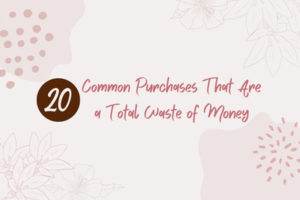When creating a budget, groceries are one of the larger expenses that need to be included. Even worse, food is expensive and prices are on the rise. How much you need to put for your budget will depend on your situation.
The total amount that households will spend on food varies, for three main reasons. One, the grocery store you choose, as fancier or specialty grocery stores are more expensive. Two, the number of people in your household – the more people you have to feed, obviously, the more it will cost. Finally, three what you buy. Take meat as an example – beef is generally more expensive than pork.
No matter your household situation, here are some easy to implement – and practical – tips for saving money on groceries. Try them out for a month and see how your grocery bill compares to past months.
Tip #1: Make a weekly meal plan
You don’t need to create anything extravagant or complicated – keep it simple. I have a white board that I stick on my fridge using magnets. I list out each day of the week, with “lunch” and “dinner” beside each day. Then, I’ll simply put “pasta”, “chicken”, etc. for each meal. Not only do I know what I’m cooking each day (which saves me time from having to decide what to cook), but I can use up the food before it goes bad.
Tip #2: Create a grocery list before you go shopping
There are two main benefits to creating a list. One, it will help you to stay focused, so that you only buy what is on your list. Two, you won’t forget what you need, which will prevent you from making several repeat trips to the grocery store. Both benefits help to stop you from buying extra food.
Tip #3: Check flyers for sales
Before you start creating your grocery list, take a quick look through the flyer for the grocery story you normally shop at. Make note of what is on sale, especially pricey food like meats. Then, incorporate those foods into your weekly meal plan and grocery list.
Tip #4: Stop buying bottled water
Instead, use tap water and invest in a Brita filter. Keep the Brita filter in the fridge, so that you’ll always have cold water. On the go? Simply pour the water in a reusable water bottle and take it with you.
Tip #5: Reconsider buying organic food
Organic food is definitely more expensive, but is it always worth it? Organic food is grown without the use of pesticides and fertilizers – so in theory, it should be better for you. But some foods have more pesticide residues than others. For the foods with low pesticide residue, go ahead and buy the non-organic version.
Tip #6: Check your receipt
Or, if you can, watch the prices as the cashier scans in your groceries. There are a few things to keep an eye on. Was the sales price reflected properly? Did the cashier scan one item in more than once by error? Did the cashier accidently use the wrong code for the fruit or vegetable being purchased? I once had a cashier accidently use the code for cherries, instead of the peaches I was purchasing – which given the price difference, would have costed me a few extra dollars.
Tip #7: Avoid grocery shopping on an empty stomach
This is one rule I always try to follow. If I don’t, I know I’ll end up buying extra food or snacks because they just look so appealing. Then, when I get home, I have a bad case of buyer’s remorse because I have food that I don’t actually like or I end up wasting food. Has that ever happened to you, or is it just me?
Tip #8: Use coupons
You don’t have to go crazy and spend a ton of time cutting up coupons for every little thing. But, even using a few coupons a week can save you some money over the course of a year. Think about it. If you could save $5/week, for 52 weeks a year, you’ll save $260 a year.
Tip #9: Buy discounted food or clearance items
For example, if meat is about to expire, grocery stores will often put it on sale in order to avoid throwing it out. Even fruits and veggies can be marked down in price. The food is still perfectly safe to eat – as long as you cook it that day. As well, grocery stores may also have a clearance section, for seasonal foods or even products they are no longer carrying.
Tip #10: Use up food you already have
How many times do you think to yourself, “there’s nothing to eat”? Challenge that thinking by taking a good look through your pantry, fridge and freezer. What food do you already have in the house that you can use? If you need to, add something else to go with it. So, go ahead and use up the frozen meat in the freezer and combine it with some canned vegetables in your pantry.
Tip #11: Skip the pre-packaged veggies
Pre-packaged vegetables are often more convenient, especially when they are already pre-cut or pre-washed. If you have the money, these can be great time savers. But otherwise, stick to the fresh and unpackaged fruits and veggies. Bonus: the unpackaged versions are often fresher and tastier!
Tip #12: Grow your own food
If you have even just a small space in your backyard, it’s easy to grow some vegetables, like beans, peas, zucchini, tomatoes, lettuce, etc. Don’t have a backyard? No worries. Try an indoor garden kit – perfect for growing herbs next to a window.
Tip #13: Ignore items on shelves that are eye-level
Why you should do that? Simple, the most expensive brands are placed at eye-level. Ohhh! Take a quick moment to look at the shelves above and below for more affordable brands.
Tip #14: Use a calculator while you shop
Why would you want to do that? Are you crazy? No, there’s a simple explanation. It’s easy to keep putting items in your cart as you shop, but when you get to the cash register, the total is a complete surprise. But if you have a strict budget, you can’t afford surprises. Instead, keep a running total of the items in your shopping cart, so you can avoid surprises at the cash register.
Tip #15: Skip the individual sized treats
Instead, buy the large packages of food or snacks. When it’s time to make lunches, simply re-package the snacks into smaller containers and pop them in your lunch box.
Tip #16: Organize your pantry and fridge
Keep like items together, so that you can easily see how much of a particular food you have in stock. This will prevent you from buying more of something that you already have. For example, keep all canned food together in the same area, with the same items beside or next to each other.
Tip #17: Take advantage of sales
Look for sales on non-food grocery items or non-perishable food. Sales are a good time to stock up on items with a long expiry date, like canned foods, toilet paper or detergent. It’s important that you know how much they cost, so shop around. A sale at one store might be the regular price at another store.
Tip #18: Only buy what you will use up
A sale isn’t worth it, if you end up throwing a lot out in the garbage. But if you can use it, or freeze it, then go for those “buy one, get one free” deals.
Tip #19: Look at the expiration date before you buy
There’s nothing worse than going to eat something, only to find out it’s already expired. Actually, there is one thing that is worse – expired food that you just bought! So, take a quick second to double check the expiry date and make sure you can actually eat all of the item – before it expires.
Tip #20: Whenever possible, leave the kids at home
My son loves to come grocery shopping, but we’ve noticed that the bill is higher when he does. That’s because he’s always seeing some food that he just has to have. Even worse, half the time he doesn’t eat it (this is also why we rarely buy food that we won’t eat).
So, which tips will you try out this month?
You’ll also like:
* 23 Tips for Frugal Living to Save a Ton of Money
* How to Create a Zero-Based Budget for Your Family
* How to Live Below Your Means – and Still Enjoy Life
Until my next blog post, here’s wishing you lots of joy and happiness!
With love,




Thank you so much for providing such an informative article. After reading this article, I got a lot of information that how we can save our money in Groceries and make good purchases with less money.
really wonderful ideas